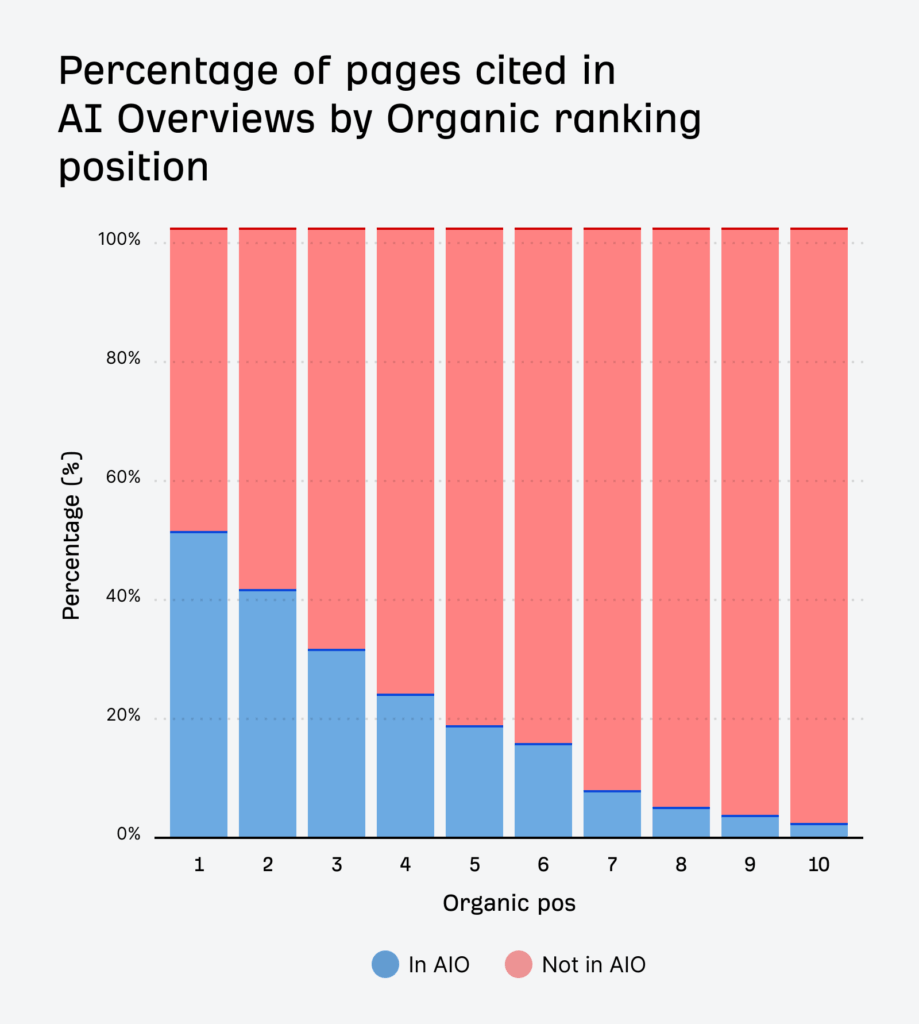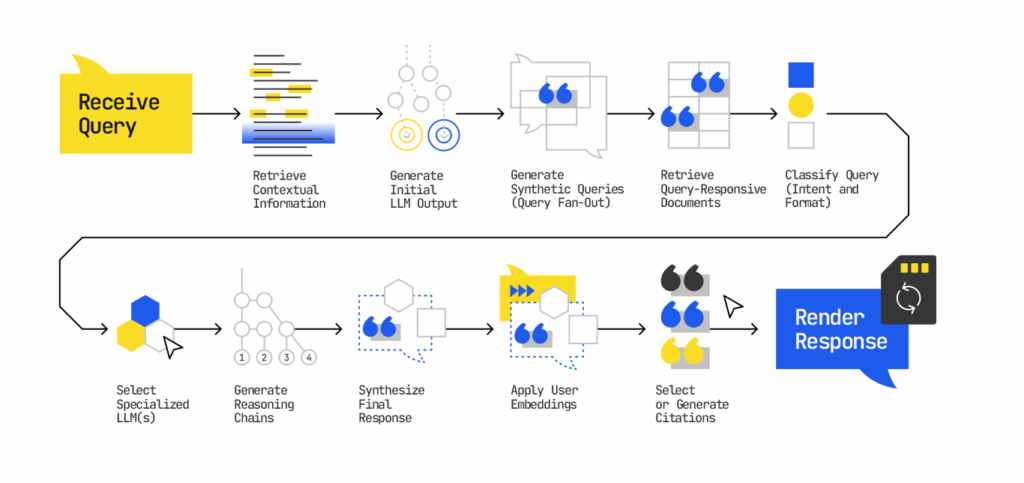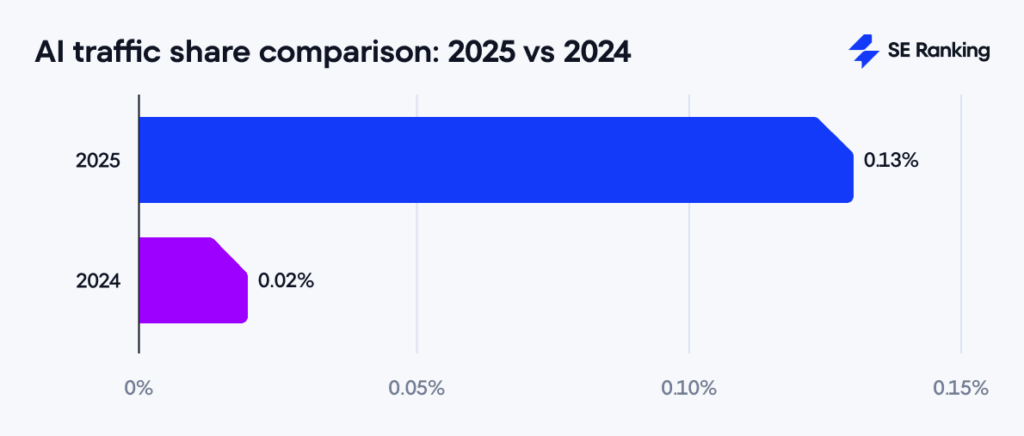
These days, many marketing leaders still approach agency selection the same way they always have: They send out requests for proposals, compare pricing, and choose whoever has the best case studies and promises the fastest results. This process worked when SEO just meant keyword research and link building. Today, it’s how you end up paying premium prices for obsolete strategies.
Search queries are getting longer, more complex, and more multimodal, and your potential customers are getting their answers before they ever visit a website.
So if your current agency is still talking about “ranking number one for your target keywords,” they’re optimizing for a search landscape that’s disappearing. The ones that understand this shift aren’t just adding “AI optimization” to their service lists; they’re reimagining how brands establish authority and visibility in an AI-mediated world.
It’s time to partner with agencies that understand how GEO actually works, and can engineer relevance across every platform where your customers discover information.
As Si Quan Ong, content marketer at Ahrefs, said in his article about AI Overviews citations:
“SEO still matters. Higher rankings improve your chances of AI Overview citations. And if you can rank high and get cited, you’re more likely to be featured prominently in the AI Overview.
However, our study also suggests that there is something beyond traditional SEO. While we don’t yet know all the factors Google uses for AIO selection, it’s clear they’re not simply lifting the top search results.”

What should that tell you?
Traditional SEO gives you a seat at the table. Good rankings increase your chances of getting cited. But getting cited requires understanding what that “something beyond” actually is. And most agencies have no clue.
Most agencies can deliver rankings or promise AI optimization, but very few understand how these systems actually work together. They’re either selling you SEO without AI understanding, or AI promises without SEO foundations.
What are the things that separate a traditional SEO agency from a GEO-ready partner? There are many factors.
One is technical depth. For example, can they explain how AI systems actually choose what content to cite? Do they understand the processes behind current terms like query fan-out, passage retrieval, and content synthesis?
Some agencies are still stuck calculating keyword densities, writing loads of meta descriptions, and obsessing over backlinks in a bid for better search visibility. But considering the current state of search and the explosive growth in AI innovations, that’s fighting a losing battle. The game has fundamentally changed, and so must the strategy.
So how do you actually evaluate whether an agency understands GEO beyond the marketing speak? Here are the specific capabilities that separate vendors and agencies that are still stuck in keyword-era thinking from those ready to engineer relevance in an AI-driven world.
A qualified GEO agency should be able to walk you through how modern AI search actually works. They should be able to tell you that when someone searches for a top-of-funnel query, AI systems don’t just look for pages with those exact keywords, but instead fan out that query into multiple related searches, retrieve relevant passages from dozens of sources, and synthesize a response based on semantic similarity and contextual relevance.
They should also know that this retrieval process depends entirely on whether AI systems can actually access and understand your content in the first place. If an AI bot can’t render JavaScript or encounters content obscurities, your perfectly optimized pages become invisible to these systems.
The right agency should be able to diagnose these technical barriers through log-file analysis, tracking exactly how different AI crawlers interact with your content infrastructure. They need capabilities to address these technical problems at scale across diverse tech stacks — because what works for a WordPress blog won’t necessarily work for a React application or enterprise CMS.

A GEO-ready agency recognizes that modern search is getting personalized. It knows that queries on AI platforms are now longer, reflecting significant changes in search psychology and user behavior, which means content must be structured completely differently. And that even beyond query length, AI systems now deliver different outputs to different users based on their search history, location, behavioral patterns, and contextual signals.
An agency that doesn’t understand how user context affects AI outputs is essentially optimizing blind. They need frameworks for audience research that connect to broader Relevance Engineering principles, understanding that content must be engineered to resonate across diverse user contexts and AI platform behaviors.
As traditional rank tracking becomes obsolete, competent agencies should be able to explain how they measure success in an environment where visibility doesn’t always translate to clicks, and where brand authority often matters more than old conversion funnels. When AI systems personalize results based on user context, previous behavior, and real-time information, the concept of universal rankings breaks down entirely.
Don’t just ask for case studies showing improved rankings. Request specific examples of how they’ve optimized content for AI citation. Can they show you before-and-after examples of content that went from being ignored by AI systems to being regularly cited across multiple platforms?
You’ve already learned the fundamentals of appearing in AI Search results (Chapter 9) and seen how Relevance Engineering works in practice (Chapter 10). Now you need to find agencies that can demonstrate mastery of these same principles. Look for partners that can show concrete examples of GEO content strategies from Chapter 11 in action, backed by the measurement and analytics frameworks detailed in Chapters 12 and 13.
Here’s what real GEO work actually looks like:
Generative search isn’t just about Google anymore. Data from SE Ranking shows that AI traffic from ChatGPT and Perplexity has grown to 0.13 percent globally — four times higher than in 2024.

Source: SE Ranking
More striking? ChatGPT alone now generates 0.11 percent of global traffic, making it the fifth- or sixth-largest traffic source worldwide.
This growth reflects how differently each platform serves user needs. For example:
But it’s not just about user behavior. The AI systems themselves have different content retrieval preferences:
A competent GEO agency should be able to explain these nuances and show how it’s optimizing content differently for each platform.
The technical sophistication gap between SEO agencies and GEO specialists becomes especially obvious when you start asking about the underlying technologies that power modern search.
Every GEO agency should understand RAG at a fundamental level (discussed more in chapter 7). RAG is the process of optimizing content so that AI systems can retrieve relevant information from knowledge bases and use that information to generate more accurate, contextual responses.

They should be able to explain how AI systems convert user queries into vector representations, search through indexed document collections, and retrieve the most semantically relevant passages.
A qualified agency understands that RAG is redefining SEO by making search engines more context-aware and personalized. They should be able to discuss how this affects content structure, information hierarchy, and citation frequency.
This is another technical deep end that requires some proven expertise. Ask them to explain their embedding strategy: How do they optimize content for vector search? What’s their approach to creating content that performs well in high-dimensional semantic space?
The right agency understands that vector embeddings are fundamental to how modern AI systems determine relevance. They should be able to discuss concepts like cosine similarity, embedding distance, and how content gets mathematically represented in vector space — all critical components of modern content relevance.
This reveals whether an agency actually works with AI systems, or just talks about them. Ask them to demonstrate their prompt-engineering process: How do they test how AI systems interpret client content? What’s their methodology for optimizing content based on AI behavior patterns?
A proper GEO agency should be able to show you examples of prompt testing, demonstrate how they reverse-engineer AI citation patterns, and explain their process for content optimization based on AI response analysis.
They should understand that different AI platforms respond differently to various content structures and formats. Their optimization strategies should account for these platform-specific preferences while maintaining brand consistency.
GEO isn’t just a technical service. It’s also a strategic shift that affects how brands build authority and visibility. Ask agencies: How do they integrate GEO with broader marketing objectives? How do they balance traditional SEO with GEO?
They should understand that in a zero-click world, brand awareness and authority often matter more than outdated conversion funnels.
The should have frameworks for interdepartmental coordination, connecting with:
GEO content strategy must optimize for AI synthesis – the process by which AI systems combine information from multiple sources into coherent responses.
Ask potential partners:
The most sophisticated agencies understand that different AI platforms have different synthesis approaches. What works optimally for ChatGPT might not work as well for Perplexity or Claude. They should have strategies for multi-platform optimization.
The biggest red flag in agency selection isn’t what they say they can do; it’s what they still think matters. If an agency leads with any of these approaches, find someone else:
An agency making ranking guarantees either doesn’t understand modern search or is being deliberately misleading. The focus should rather be on brand visibility in AI responses and semantic authority.
Traditional content marketing focused on publishing high volumes of blog posts targeting keyword lists. This spray-and-pray approach doesn’t work in an environment where AI systems evaluate content for semantic coherence, factual accuracy, and unique insights.
Agencies that only track traditional SEO metrics miss the fundamental shift in how visibility translates to business outcomes. Since zero-click searches represent significant portions of user behavior, and AI citations don’t always correlate with traffic, these measurement frameworks provide incomplete pictures of marketing performance.
The best agencies track AI citations, brand mentions in AI responses, and cross-platform citation consistency alongside these metrics. They understand that visibility in AI responses can build brand authority and influence purchase decisions even without direct clicks.
The agencies and enterprise SEO firms that will succeed in the GEO era think completely differently about optimization, measurement, and strategy:
They don’t just optimize individual pages or pieces of content. They engineer entire content ecosystems designed for AI discovery. They understand how different pieces of content work together to build semantic authority and topical expertise.
Ask them: How do they approach content clustering for semantic authority? What’s their strategy for creating interconnected content that reinforces topical expertise across multiple AI platforms?
They understand the mathematical foundations of modern search – vector embeddings, semantic similarity, clustering algorithms, and retrieval systems. They can explain how content gets mathematically represented and optimized without getting lost in jargon.
More important, they can translate this technical understanding into practical strategies that drive business results. They bridge the gap between cutting-edge AI developments and actionable marketing strategies.
GEO doesn’t exist in isolation. The best agencies understand how to integrate generative search optimization with:
They should be able to explain how GEO fits into your broader marketing ecosystem and supports your overall business strategy, rather than existing as an isolated technical project.
If there’s anything you take away from this chapter, let it be this:
Proactive agencies like iPullRank are already preparing for scenarios in which traditional search results disappear entirely, replaced by AI-powered interfaces that provide direct answers rather than links to external sources. They’re building content strategies and optimization methodologies that will remain relevant as search continues to evolve.
So the choice isn’t whether to adapt to AI Search. That ship has sailed.
The choice is whether you’ll partner with agencies that understand the full scope of what’s coming, or get left behind by sticking with strategies that others already recognize as outdated.
If your brand isn’t being retrieved, synthesized, and cited in AI Overviews, AI Mode, ChatGPT, or Perplexity, you’re missing from the decisions that matter. Relevance Engineering structures content for clarity, optimizes for retrieval, and measures real impact. Content Resonance turns that visibility into lasting connection.
Schedule a call with iPullRank to own the conversations that drive your market.

The appendix includes everything you need to operationalize the ideas in this manual, downloadable tools, reporting templates, and prompt recipes for GEO testing. You’ll also find a glossary that breaks down technical terms and concepts to keep your team aligned. Use this section as your implementation hub.
//.eBook

The AI Search Manual is your operating manual for being seen in the next iteration of Organic Search where answers are generated, not linked.
Prefer to read in chunks? We’ll send the AI Search Manual as an email series—complete with extra commentary, fresh examples, and early access to new tools. Stay sharp and stay ahead, one email at a time.
Sign up for the Rank Report — the weekly iPullRank newsletter. We unpack industry news, updates, and best practices in the world of SEO, content, and generative AI.
iPullRank is a pioneering content marketing and enterprise SEO agency leading the way in Relevance Engineering, Audience-Focused SEO, and Content Strategy. People-first in our approach, we’ve delivered $4B+ in organic search results for our clients.
We’ll break it up and send it straight to your inbox along with all of the great insights, real-world examples, and early access to new tools we’re testing. It’s the easiest way to keep up without blocking off your whole afternoon.
